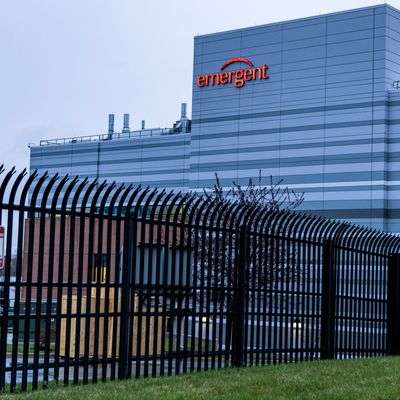
Days after Johnson & Johnson announced that it had to throw out 15 million doses of its increasingly popular one-shot coronavirus vaccine due to a screw-up at a plant run by manufacturing partner Emergent BioSolutions, the Biden administration has stepped in and put Johnson & Johnson in charge of vaccine production at the plant. The New York Times reported Saturday that the Department of Health and Human Services, in an “extraordinary move,” has directed J&J to bring in a new leadership team and take over all aspects of manufacturing the vaccine at the Baltimore plant.
The contract manufacturer, Emergent, had been making both the J&J and AstraZeneca vaccines at the facility, and ruined one batch of the J&J vaccine last month after it mixed up the ingredients from the two. Moving forward, per HHS, the plant will only produce the J&J vaccine. The production of the AstraZeneca vaccine, which still hasn’t been authorized for use in the U.S. by the Food and Drug Administration, will be moved elsewhere; it’s not yet clear if Emergent will be left in charge of that operation. The Times adds that, “Experts in vaccine manufacturing said that in the past, the [FDA] had a rule to prevent such mishaps by not allowing a facility to make two live viral vector vaccines, because of the potential for mix-ups and contamination.” It’s not clear when or why that rule was abandoned, either in this specific case, or overall.
Johnson & Johnson said that it was “assuming full responsibility” for production at the Baltimore plant, and “adding dedicated leaders for operations and quality, and significantly increasing the number of manufacturing, quality and technical operations personnel to work with the company specialists already at Emergent.” It will also reportedly bring in personnel from Merck, which J&J has contracted with to produce its vaccine, as well.
An Emergent spokesperson told the Washington Post that the company was “welcoming additional Johnson & Johnson personnel on-site at [the plant] for their technical expertise and support.”
To be clear, no affected doses were apparently shipped from the facility, and the problem was detected during routine quality control checks, as it should have been. The only J&J COVID shots administered in the U.S. thus far have been ones produced by the company’s regulated facility in the Netherlands. In fact, because the Baltimore plant is still awaiting FDA approval, none of the correctly manufactured vaccine supply it has produced is yet eligible for consumer use, either. It’s not clear how that approval timeline will be affected by the botched batch and J&J takeover. Notes the Times:
Officials have said it may take weeks to sort out whether other batches of vaccine were contaminated and for F.D.A. inspectors to determine whether the Emergent plant can be cleared to release any doses that it has made.
Regardless, the facility was just one part of Johnson & Johnson’s COVID-vaccine production operation, and Emergent one of eight companies it has partnered with. J&J has said it still expects to deliver 100 million doses to the U.S. government by the end of May.
BioSolutions, a longtime U.S. government biodefense contractor, has received billions of federal dollars to help the U.S. build its Strategic National Stockpile, particularly as sole manufacturer of the BioThrax anthrax vaccine, as well as a company that consolidated control over the production of other stockpile supplies for guarding against bioterrorism. The Times reported last month that, “In the two decades since the [strategic] repository was created, Emergent’s aggressive tactics, broad political connections and penchant for undercutting competitors have given it remarkable sway over the government’s purchasing decisions related to the vaccines, the interviews and documents show.”
And that contributed to the shortage of pandemic-fighting supplies which has plagued the U.S. response:
Throughout most of the last decade, the government has spent nearly half of the stockpile’s half-billion-dollar annual budget on the company’s anthrax vaccines, The Times found. That left the government with less money to buy supplies needed in a pandemic, despite repeatedly being advised to do so.
Last year, the company lined up deals worth more than $740 million to produce vaccines for J&J and AstraZeneca, as well as a $628 million deal with the U.S. government as part of the Trump administration’s Operation Warp Speed, to reserve production space at the Baltimore plant. Per the Post:
Emergent’s $628 million Warp Speed deal was made as part of a long-standing contract between the company and the office in the Department for Health and Human Services (HHS) responsible for preparing for public health threats. At the time of the award, that office was led by Assistant Secretary Robert Kadlec. The Post previously reported that before joining the Trump administration, Kadlec was paid as a consultant to Emergent and formed a start-up company with Emergent’s chairman. Kadlec did not mention either role in a questionnaire about his career that he completed for the Senate when it considered his nomination by Trump in 2017. Kadlec and Emergent previously told The Post that Kadlec’s past work for Emergent had no bearing on the firm’s government contracts.
On April 20, less than six weeks before the Warp Speed deal was awarded, an FDA inspector filed a report detailing several problems at the facility, the Post reported Thursday:
Some employees had not been properly trained. Records were not adequately secured. Established testing procedures were not being followed. And a measure intended to “prevent contamination or mix-ups” was found to be deficient.
The Associated Press also reported Thursday that according to records it obtained dating back to 2017, the FDA “repeatedly has cited Emergent for problems such as poorly trained employees, cracked vials and problems managing mold and other contamination around one of its facilities.”
An Emergent spokesperson told the Post that the company “has hosted two subsequent onsite FDA visits associated with our COVID-vaccine efforts that include reviews of the progress on the items cited in past FDA visits,” while an HHS spokesperson responded that it had “worked with Emergent to resolve the issues before SARS-CoV-2 vaccine production began at the Maryland facility.”
Again, it’s important to underline that the Johnson & Johnson COVID vaccine is safe, and the Baltimore plant screw-up — which was discovered by the company’s normal quality-control procedures — has had no impact on the safety of the vaccine in circulation, or on any J&J doses that have already been administered.
However, reports from the New York Times and Politico published on April 6 cast further doubt on the ability of the Emergent facility to recover from the crisis. In June 2020, senior Trump officials were made aware of inadequate manufacturing standards at the plant in a government report which stated that the company’s failures to hire and maintain skilled workers left the production vulnerable to error. That report was handed to the Biden administration during the transition.
According to the Times, the tossed J&J shots were not the first batch Emergent lost out of fear of contamination either: Between October and January, between 10 million and 15 million AstraZeneca doses were scrapped due to contamination or suspected contamination. Considering this track record, the paper reports that federal officials are “privately concerned that the government is stuck in an unhappy marriage with Emergent and that Johnson & Johnson, whose manufacturing expertise is largely overseas, may not be able to salvage it.”






























